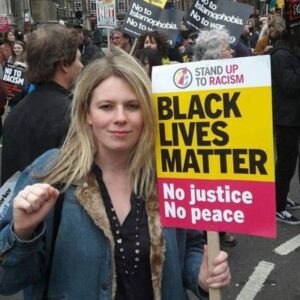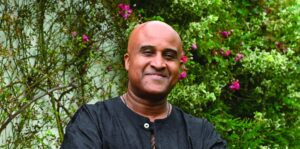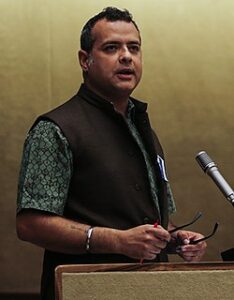Obsolete Cold War Attitudes Are Holding Europe Back
Instead, an independent foreign policy is desperately needed—and gaining support.
Recently, the United States has been followed by a number of European countries in supporting a cold war policy toward Russia and China. This has created increasing problems in Europe—bringing a major war to the continent, creating serious economic difficulties, and intensifying a decline in living standards.
In this context, the case for Europe establishing an independent foreign policy has gained support, as a way of ensuring security and prosperity.
The U.S. Brings Hot War to Europe
Starting with the most extreme expression of the situation, the war in Ukraine has claimed tens of thousands of lives. The UN calculates nearly 18 million people need humanitarian assistance and millions have been displaced.
This tragedy was avoidable. The underlying cause of the war was the U.S. policy to expand NATO up to Russia’s border, including the proposal that Ukraine join NATO when Russia has repeatedly made clear that that is a ‘red line’ threat to its security interests. The U.S. continued to push for NATO expansion despite this.
The absence of an independent European foreign policy has been demonstrated in the policy of major European governments during the past year, with these governments supporting U.S. policy in Ukraine.
This has been extraordinarily expensive. In 2022, NATO powers allocated huge sums to Ukraine—about 18 million people from the U.S., €52 billion from the EU and its member states, and £2.3 billion from Britain. In 2023, there has been an escalation in military aid sent. After pressure from the U.S., Germany approved the deployment of their Leopard tanks, while the British government is sending depleted uranium munitions.
Militarization in Europe is clearly on the rise, in the past year, with major European governments increasing military spending—something the U.S. has called for over many years.
Last year, German Chancellor Olaf Scholz pledged €100 billion in military spending, committing Germany to spend 2 percent of GDP on defense going forward. President Emmanuel Macron is increasing France’s military spending to around €60 billion by 2030—approximately double 2017’s allocation. Britain, historically the U.S.’s closest European ally, already spends 2.2 percent of GDP on the military, £48 billion a year.
The U.S., in turn, has 100,000 troops stationed in Europe and numerous military bases, including 119 in Germany.
The impact of this has negatively affected Europe’s interests. Without an effort to negotiate peace in Ukraine, rather than escalation, many will die and be displaced. Meanwhile, across Europe, there is an impact of high energy prices as a result of sanctions on Russia, while increased military spending diverts resources away from addressing the cost-of-living crisis. Europe has become more dangerous and poorer.
The U.S. has not supported recent proposals for peace in Ukraine, such as those from China, which means a prolonged war. European countries could pursue a different path and play a role in backing negotiations to end the conflict.
Global Cooperation Is the Key to Economic Prosperity
Economically, Europe faces a parallel crisis. Slow economic growth, high inflation, and government austerity policies are hitting living standards while some European governments’ policies toward Russia and China have made the situation worse.
Europe has been seriously damaged by participation in sanctions against Russia. These have increased energy prices while the U.S. has profited from selling more expensive liquefied gas to Europe to replace cheaper Russian gas delivered by pipelines. Journalist Seymour Hersh has made a serious case that the U.S. was also responsible for blowing up the Nord Stream pipelines between Russia and Germany. But European governments have failed to support the call for an independent investigation into this attack on Europe’s energy infrastructure.
The U.S. has also urged Europe to pursue a more anti-China posture. This recently led to Europe’s relationship with China deteriorating. The Comprehensive Agreement on Investment between China and the EU, agreed in principle in December 2020, has not been signed despite the economic opportunities it opens for Europe. European governments are also being asked to join the U.S. attacks on China’s technology industry, some recently banning TikTok from government work phones with pressure for a wider ban.
The economic consequences of this direction would be serious for Europe. China is the EU’s largest trading partner and the most rapidly growing major economy. The IMF’s latest growth projections for 2023 estimate China will grow by 5.2 percent—six times faster than the euro area’s 0.8 percent. The potential benefits for Europe of increasing win-win economic cooperation with China are therefore considerable.
The Struggle for an Independent Foreign Policy
The U.S.’s new cold war policy has therefore tended to produce chaos in Europe. In light of this, there are now signs some major European politicians do not wish to continue down this course.
President Macron made a widely reported comment following his April 2023 visit to China. He stated that Europe must not be a “follower” of the U.S. when it comes to Taiwan, a key issue, and should instead pursue “strategic autonomy.” This followed significant economic deals struck between France and China during Macron’s visit. It remains to be seen whether Macron will have the political strength to follow through on such an independent approach, particularly given the backlash these comments immediately received from Washington.
In March 2023, Spain’s Prime Minister Pedro Sánchez struck a similarly independent tone, stating, “Relations between Europe and China do not need to be confrontational. There is ample room for win-win cooperation.”
Globally, the pursuit of an independent foreign policy is a growing trend. Such an approach has sustained peace in Asia with most countries focusing on economic development rather than confrontation. The recent breakthrough restoring diplomatic relations between Saudi Arabia and Iran, established with China aiding negotiations, opens up the possibility of overcoming a number of conflicts in the Middle East. In Latin America, Lula’s recent reelection in Brazil strengthens the political forces in favor of regional independence and development.
Trends in Europe seeing an independent foreign policy as important for the region’s future are therefore in line with this overall global development.
Japan Signals An Attitude Shift To The Growing Power Of The Global South
In mid-April, the Japanese Ministry of Foreign Affairs released its Diplomatic Bluebook 2023, its most important guidebook on international affairs. Japan’s foreign minister, Yoshimasa Hayashi, wrote the foreword, which begins: “The world is now at a turning point in history.” This phrase is key to understanding the Japanese approach to the war in Ukraine. Hours after Russian forces entered Ukraine, the Japanese government signed the G7 statement that condemned the “large-scale military aggression” and called for “severe and coordinated economic and financial sanctions.” The next day, Hayashi announced that Japan would sanction “designated individuals related to Russia,” freeze assets of three Russian banks, and sanction exports to Russia’s military. In its Diplomatic Bluebook 2022, Japan condemned Russia and urged the Russian government to “withdraw its troops immediately, and comply with international law.” Russia’s war, the Japanese argued, “shakes the very foundation of the international order,” an order whose attrition, as the new Bluebook argues, has brought the world to this “turning point.”
National Interests
Despite all the talk of sanctions, Japan continues to import energy from Russia. In 2022, 9.5 percent of Japan’s imported liquefied natural gas came from Russia (up from 8.8 percent in 2021). Most of this energy came from Russia’s Sakhalin Island, where Japanese companies and the government have made substantial investments. In July 2022, Hayashi was asked about Japan’s continued imports from Sakhalin-2. His answer was clear: “Sakhalin-2 is an important project for energy security, including the stable supply of electricity and gas in Japan.” Since July, Japan’s officials have continued to emphasize Japan’s national interests—including through the Sakhalin-2 natural gas project—over its obligations to the G7 and to its own statements about the war. In August 2022, the Japanese government asked two private firms—Mitsui and Mitsubishi—to deepen its involvement in Russia’s Sakhalin-2; “We will respond by working with the public and private sectors to protect the interests of the companies and secure [a] stable supply of liquefied natural gas,” said former Minister of Economy, Trade and Industry Kōichi Hagiuda.
In March 2022, Kyodo News reported that a leaked version of the Diplomatic Bluebook 2022 used a rather startling phrase—“illegal occupation”—to describe Russian control over islands north of Hokkaido. The Japanese government had not used that phrase since 2003, largely because of increased diplomatic activity between Japan and Russia driven by the collaboration over the development of Sakhalin-2. As it turned out, the draft that Kyodo News had seen was altered so that the official Diplomatic Bluebook of 2022 did not use this phrase. Instead, the Bluebook noted that the “greatest concern between Japan and Russia is the Northern Territories issue,” which “is yet to be resolved.” Japan could have taken advantage of the Western animosity against Russia to press its claim on these islands, but instead, the Japanese government merely hoped that Russia would withdraw from Ukraine and return to “negotiations on a peace treaty” regarding the islands north of Japan.
Three New Points
The Diplomatic Bluebook 2023 makes three important points: that the post-Cold War era has ended, that China is Japan’s “greatest strategic challenge” (p. 43), and that Global South countries must be taken seriously. The Bluebook highlights Japan’s confusion, caught between its reliance upon Russian energy and the growing confidence of the Global South.
The Bluebook from 2022 noted, “The international community is currently undergoing an era-defining change.” Now, however, the Bluebook 2023 points to the “end of the post-Cold War era” (p. 3), which is illustrated by the collapse of the U.S.-led world order (which both the United States and Japan call the “rules-based international order”). Washington’s power has declined, but it is not clear what comes next.
Anxiety about the growing role of China in Asia is not new for Japan, which has long contested the Diaoyu (China)/Senkaku (Japan) islands. But now, there is a much more pronounced—and dangerous—assessment of the situation. The Bluebook 2023 notes the close alignment between China and Russia, although it does not focus on that strategic partnership. Rather, the Japanese government focuses on China, which it now sees as Japan’s “greatest strategic challenge.” Even here, the Japanese government acknowledges that the two countries “have held a series of dialogues to discuss common issues.” The “efforts of both Japan and China” are important, says the Bluebook, to build a “constructive and stable” relationship (p. 43).
Finally, the Japanese government accepts that there is a new mood in the Global South, with countries across Africa, Asia, and Latin America unwilling to submit any longer to the will of the Western states. In January 2023, a reporter from Yomiuri Shimbun asked the Foreign Ministry’s press secretary Hikariko Ono how Japan defined the “Global South.” Her tentative reply is instructive. “The Government of Japan does not have a precise definition of the term Global South,” she said, but “it is my understanding that in general, it often refers to emerging and developing countries.” The Ministry of Foreign Affairs, she noted, must “strengthen engagement with the Global South.” In the Bluebook 2023, the Japanese recognize that Global South countries are not following the Western position on Ukraine and that berating the countries of the Global South raises accusations of “double standards” (wars by the West are acceptable, but wars by others are unacceptable) (p. 3). Japan will promote multilateralism, building “an inclusive approach that bridges differences.” A new “attitude is required,” says the Bluebook.
In March, Japan’s Prime Minister Fumio Kishida met with President Volodymyr Zelenskyy in Ukraine. Both sides said that they were working to share security information, but Japan once more refused to send weapons to Ukraine. A few weeks after Kishida left Ukraine, Mitsuko Shino, Japan’s Deputy Permanent Representative to the United Nations warned in a guarded statement about the “risks stemming from violations of the agreements regulating the export of weapons and military equipment” and about the importance of the Arms Trade Treaty. Japan remains caught in the horns of its own dilemma.
Author Bio:
This article was produced by Globetrotter
Vijay Prashad is an Indian historian, editor, and journalist. He is a writing fellow and chief correspondent at Globetrotter. He is an editor of LeftWord Books and the director of Tricontinental: Institute for Social Research. He is a senior non-resident fellow at Chongyang Institute for Financial Studies, Renmin University of China. He has written more than 20 books, including The Darker Nations and The Poorer Nations. His latest books are Struggle Makes Us Human: Learning from Movements for Socialism and (with Noam Chomsky) The Withdrawal: Iraq, Libya, Afghanistan, and the Fragility of U.S. Power.
Source: Globetrotter
The Global South Is Done Waiting For The UN To Solve Humanity’s Challenges
Dag Hammarskjöld, the tragic second United Nations secretary general, once said the organization “was created not to lead mankind to heaven but to save humanity from hell.”
Of course, this depends very much on what kind of hell you had in mind.
The fallout from Adolf Hitler’s extermination camps must have dominated Hammarskjöld’s world during his tenure from 1953 until his sad death in a plane crash in 1961. So must have the shadow of possible nuclear annihilation arising from the Cold War between the United States and the Soviet Union.
What he may have been able to say, even back then, is that the U.S. saw itself as the predominant world power, prepared to unleash its own version of hell whenever and however it wanted.
Hammarskjöld must have known that the UN was completely powerless to reign in the U.S. and it could, and usually did, do pretty much anything that it wanted on the world stage.
The UN is, and has been for some time, a pretty meaningless institution that merely acts as a useful idiot when the White House decides it has some role to perform in protecting U.S. interests.
The proxy war being conducted by the U.S. against Russia in Ukraine and the ramping up of tensions against China with no meaningful sign of life from the UN to stop what’s happening is a clear example.
The UN, based in the belly of the beast itself in New York, is a body devoid of any worthwhile criticism of the U.S.
The fact that for the last 30 consecutive years, the vast majority of countries at the UN General Assembly have demanded the lifting of the illegal embargo by the U.S. on Cuba is completely ignored. But every country is expected by the U.S. to follow its instruction to sanction Russia for its invasion of Ukraine.
In 2003 Colin Powell told the UN Security Council, supposedly the organization’s key body, that the U.S. had evidence that Iraq had clear weapons of mass destruction and this was a justification for going to war.
Of course, President George W. Bush was going to invade Iraq anyway but the White House clearly felt it was important to send their top diplomat to the UN to tell what everyone in their administration knew to be a lie to get international support for their misadventure.
Even the U.S. Congress found that the administration had lied but at the UN there has been a deafening silence about any sanction against the U.S. for lying to the world so it could kill hundreds of thousands of people in the name of regime change.
While China and Brazil appear to be making efforts to bring about peace in Ukraine, there are no meaningful peace moves from the UN.
It took the Chinese to bring Saudi Arabia and Iran together to broker a deal that looks as though it might bring about peace in the nearly nine-year-old conflict in Yemen. The UN failed.
Just this week the U.S. tried unconvincingly to insist that after originally bringing the Saudis and the Iranians together the Chinese had done nothing to bring about peace in Yemen.
That, apparently, was done by a junior official from the U.S. State Department making a phone call to the Saudis.
One can only presume that the UN knows that the U.S. and the military-industrial complex it administers are deeply woven into both conflicts, making any attempt to go against its will futile.
There seems little chance that the US will ever have to face the music even when its wrongdoing is universally acknowledged.
When, in 2010, Julian Assange and WikiLeaks demonstrated clear breaches of international law through leaks provided by U.S. Army intelligence analyst Chelsea Manning, there was never the remotest chance that the U.S. would be held to account.
For the U.S., this was in fact a signal to go after Manning and Assange rather than be held accountable.
Its diplomats even had the gall to walk out of a UN meeting recently when a Russian representative, accused of war and human rights violations alongside President Vladimir Putin, began to speak.
The UN is reduced to being a mere conference organizer on important issues such as the climate emergency, water, and a range of other issues.
The fact that these conferences take place is important. But there are rarely real outcomes that make any difference from the marathon “negotiation” sessions that are usually highlighted from these conferences.
When observers believe that there are real outcomes, the reality is that the UN has no teeth or desire to hold the most difficult nations, such as the US, to account for anything they choose to do or not do as a result of the conference.
I am not arguing that bringing all the nations of the world together under one roof to debate the challenges facing the planet is not important. Far from it—it is vital. But it is only important if the organization has the teeth to hold everyone equally to account.
This has led countries of the Global South to look for new ways to do business.
Within the UN system, for example, the African Union is demanding permanent representation on the Security Council. It will likely achieve that as the scramble for influence over the still abundant natural resources of the continent continues.
But many countries of the Global South are now seeing much more value in creating structures that take their interests into account—not just as pawns of the U.S.
The BRICS alliance of Brazil, Russia, India, China, and South Africa is attracting major interest from other countries such as Saudi Arabia and Iran.
The BRICS nations are also set to trade among themselves in their own currencies as a prelude to developing their own common currency for the Global South. This will smash the dominance of the dollar over the vast majority of the world’s population.
The message for the UN is that you can be relevant to the Global South or you can sit in your rocking chair smoking your pipe, chatting about the good old days with the U.S. while large swathes of the global population go about their business to make a real difference to their people.
Author Bio:
This article was produced by Globetrotter.
Roger McKenzie is the international editor of the Morning Star newspaper. Follow Roger on Twitter at @RogerAMck
Source: Globetrotter
A New Leader’s Big Banking Opportunity To Improve Global Development
Will the New Development Bank and the Contingent Reserve Arrangement be able to fulfill their original mission with the arrival of the new bank president Dilma Rousseff?
The first event of President Lula da Silva’s long-awaited visit to China in mid-April 2023 is the official swearing-in ceremony of Dilma Rousseff as president of the New Development Bank (popularly known as the BRICS Bank) on April 13. The appointment of the former president of Brazil to the post demonstrates the priority that Lula will give to the BRICS countries (Brazil, China, India, Russia, and South Africa) in his government. In recent years, BRICS has been losing some of its dynamism. One of the reasons was the retreat of Brazil—which had always been one of the engines of the group—in a choice made by its right-wing and far-right governments (2016-2022) to align with the United States.
A New Momentum for BRICS?
After the last summit meeting in 2022, hosted by Beijing and held online, the idea of expanding the group was strengthened and more countries are expected to join BRICS this year. Three countries have already officially applied to join the group (Argentina, Algeria, and Iran), and several others are already publicly considering doing so, including Indonesia, Saudi Arabia, Turkey, Egypt, Nigeria, and Mexico.
The BRICS countries occupy an increasingly important place in the world economy. In GDP PPP, China is the largest economy, India is third, Russia sixth, and Brazil eighth. BRICS now represents 31.5 percent of the global GDP PPP, while the G7 share has fallen to 30 percent. They are expected to contribute over 50 percent of global GDP by 2030, with the proposed enlargement almost certainly bringing that forward.
Bilateral trade between BRICS countries has also grown robustly: trade between Brazil and China has been breaking records every year and reached $150 billion in 2022; between Brazil and India, there was a 63 percent increase from 2020 to 2021, reaching more than $11 billion; Russia tripled exports to India from April to December 2022 compared to the same period the preceding year, expanding to $32.8 billion; while trade between China and Russia jumped from $147 billion in 2021 to $190 billion in 2022, an increase of about 30 percent.
The conflict in Ukraine has brought them closer together politically. China and Russia have never been more aligned, with a “no limits partnership,” as visible from President Xi Jinping’s recent visit to Moscow. South Africa and India have not only refused to yield to NATO pressure to condemn Russia for the conflict or impose sanctions on it, but they have moved even closer to Moscow. India, which in recent years has been closer to the United States, seems to be increasingly committed to the Global South’s strategy of cooperation.
The NDB, the CRA, and the Alternatives to the Dollar
The two most important instruments created by BRICS are the New Development Bank (NDB) and the Contingent Reserve Arrangement (CRA). The first has the objective of financing several development projects—with an emphasis on sustainability—and is regarded as a possible alternative to the World Bank. The second could become an alternative fund to the IMF, but the lack of strong leadership since its inauguration in 2015 and the absence of a solid strategy from the five member countries has prevented the CRA from taking off.
Currently, one of the major strategic battles for the Global South is the creation of alternatives to the hegemony of the dollar. As the Republican U.S. Senator Marco Rubio confessed in late March, the United States will increasingly lose its ability to sanction countries if they decrease their use of dollars. Almost once every week, there is a new agreement between countries to bypass the dollar, like the one recently announced by Brazil and China. The latter already has similar deals with 25 countries and regions.
Right now, there is a working group within BRICS whose task it is to propose its own reserve currency for the five countries that could be based on gold and other commodities. The project is called R5 due to the coincidence that all the currencies of BRICS countries start with R: renminbi, rubles, reais, rupees, and rands. This would allow these countries to slowly increase their growing mutual trade without using the dollar and also decrease the share of their international dollar reserves.
Another untapped potential so far is the use of the Contingent Reserve Arrangement (totaling $100 billion) to rescue insolvent countries. When a country’s international reserves run out of dollars (and it can no longer trade abroad or pay its foreign debts), it is forced to ask for a bailout from the IMF, which takes advantage of the country’s desperation and lack of options to impose austerity packages with cuts in state budgets and public services, privatizations, and other neoliberal austerity measures. For decades, this has been one of the weapons of the United States and the EU to ensure the implementation of neoliberalism in the countries of the Global South.
Right now, the five BRICS members have no issues at all with international reserves, but countries like Argentina, Sri Lanka, Pakistan, Ghana, and Bangladesh find themselves in a bad situation. If they could access the CRA, with better conditions for repaying the loans, this would mean a political breakthrough for BRICS, which would begin to demonstrate their ability to build alternatives to the financial hegemony of Washington and Brussels.
The NDB would also need to start de-dollarizing itself, having more operations with the currencies of its five members. For instance, from the $32.8 billion of projects approved so far at NDB, around $20 billion was in dollars, and around the equivalent of $3 billion was in Euros. Only $5 billion was in RMB and very little was in other currencies.
To reorganize and expand the NDB and the CRA will be a huge challenge. The leaderships of the five countries will need to be aligned on a common strategy that ensures that both instruments fulfill their original missions, which won’t be easy. Dilma Rousseff, an experienced and globally respected leader, brings hope for a new beginning. Rousseff fought against Brazil’s civil-military dictatorship in the 1960s and 1970s and spent three years in prison for it. She became one of President Lula’s key ministers in the 2000s, and she was elected Brazil’s first female president and then won reelection (2010 and 2014). She was in office until she was overthrown by a coup based on fraudulent grounds by Congress (2016)—which has already admitted the fraud. She just returned to political life to run one of the most promising institutions in the Global South. After all, President Dilma Rousseff has never shied away from huge challenges.
Author Bio:
This article was produced by Globetrotter.
Marco Fernandes is a researcher at Tricontinental: Institute for Social Research. He is the co-editor of Dongsheng. He is a member of the No Cold War collective. He lives in Beijing.
Source: Globetrotter
Fifty Years After Chile’s Coup, The First Year Of Popular Unity
Ten days after the 1973 coup against the Popular Unity (UP) government of President Salvador Allende, the military opened the Río Chico concentration camp on Dawson Island, located in the Strait of Magellan, near the southern tip of Chile. The island had served as an extermination camp by a Catholic order between 1891 and 1911 to confine the Selk’nam and Kawésqar peoples, who died due to overcrowding, the spread of disease, and the cold.
The coup regime sent 38 officials of the UP government to the Compañía de Ingenieros del Cuerpo de Infantería Marina (COMPINGIM) naval base and then to the Río Chico camp. It also sent hundreds of political prisoners to Punta Arenas, near Dawson Island. The officials were interrogated, tortured, and forced to work on the island’s infrastructure. The Río Chico camp was dismantled in 1974.
One of the prisoners at the camp was Miguel Lawner, an architect who led the government’s Urban Improvement Corporation (CORMU). During his imprisonment, Lawner walked around the prison to calculate the size of his room, the buildings at the camp, and the camp itself. He drew the layout for the camp but then destroyed it for fear of discovery by the guards. When he was in exile in Denmark in 1976, Lawner redrew the plans from memory. “The function creates the organ,” he said. “I developed an organ: the drawing, capable of fulfilling the function of leaving testimony of our captivity.”
During his imprisonment, Lawner told me, he worried that the military might accuse him of corruption for his leadership of CORMU. “I was trying to calculate how many millions of dollars had been [spent] in my name,” he recalled. “I calculated it to be between $150 million and $180 million. Later, I learned that the military spent six months investigating me and came to the conclusion that they owed me a per diem!”
The UP government (1970-1973) felt that the ministries of Housing and Public Works should be the engine of the economy, as “the two easiest institutions to mobilize,” Lawner said. Other areas, such as industrialization, “required more prolonged prior studies.” “In housing,” Lawner told me, “if you have a vacant lot, the next day you can be building.” In addition, there was a huge need for housing. The CORMU management decided to speed up the bureaucratic procedures and authorize the immediate disbursement of funds through an official, who was Lawner. “Our first year of government was a year of marvelous irresponsibility,” Lawner told me with a smile on his face.
Never Deviate From the Fundamentals
During the 1970 campaign for the presidency, Lawner accompanied Allende to a camp on the banks of the Mapocho River, where the people lived “outside the walls of society.” As they left the camp, Allende said to Lawner, “Even if things go badly for us, to get these comrades out of the mud—for that, it would be worthwhile for them to elect me president.” One year into the government, Lawner said, “We delivered the first houses of Villa San Luis. In April ’72 we had this project completely delivered: a thousand houses, the great majority of which corresponded to these two camps, el encanto and el ejemplo, which sat on the banks of the Mapocho River.” The main task of the UP government, he said, was “to resolve the fundamental demands of the sectors that had always been dispossessed.”
Under Lawner’s leadership, the CORMU officials—not all of them part of the UP project—postponed vacations and worked without overtime pay. “We gave all these officials the conviction that they were operating for the benefit of the common good and not, obviously, for the enrichment of a private company or the banks. In other words, they knew that they were working so that people could live better.” Also, he said, the objective of “making things beautiful” was imposed, arguing “that in social housing, beauty does not have to be the birthright only of the rich.”
The Explosion of the Countryside
Lawner recalled his great pride at the UP government’s nationalization of copper, its delivery of houses, and its role in the “explosion of the agrarian world.” The agrarian reform and the law for peasant unionization were passed in 1962, before the UP government. However, agrarian workers “continued to exist like serfs from feudal times,” Lawner noted. A week into his presidency, Allende was invited by the peasants of Araucanía to a meeting to which he brought his minister of agriculture, Jacques Chonchol. When an Indigenous leader spoke, Allende leaned over to Chonchol and said, “Listen, minister, I think you should remain here.” The minister, who “had to send for even his toothbrush,” remained there for three months, beginning his term installed in the countryside. Half a million hectares were transferred to the landless in the first year of the government.
The UP’s first year, Lawner recalled, was a “year of unbridled aspirations.” “For a person like me who was never a public official, the feeling of power is infinite, and the conviction that you are capable of doing anything is equally infinite… we promised more than we were capable of doing [having done three or four times more than the most that had ever been done in the history of the housing ministry], but everything we could do was done because of what is now lacking: the commitment of the officials. You have to have good leadership, it is true, but if you don’t have the commitment of the base, there is nothing you can do.”
Generations Contaminated by the Model
When we talked about the differences between the experiences at the end of the first year of the UP and the first year of Chile’s current President Gabriel Boric’s progressive government, Lawner pointed out that, in Chile “we have effectively been fed for 50 years the neoliberal doctrine of a formation contradictory to what you require in a progressive government. Imperceptibly, generations were formed that are, in my opinion, corrupted by the model. It is incomprehensible to them any other way.”
The current president of Chile’s Senate is Juan Antonio Coloma, a man of the extreme right. “When the 50th anniversary of the coup comes this September,” Lawner told me, “Coloma will be the country’s second most important political official.” Fascism’s rise, he said, is a global phenomenon, not only taking place in Chile. But Lawner does not despair. “You cannot determine when there is a spark that lights the fire again, but there is no doubt that it is going to happen.”
Author Bio:
Globetrotter
Taroa Zúñiga Silva is a writing fellow and the Spanish media coordinator for Globetrotter. She is the co-editor with Giordana García Sojo of Venezuela, Vórtice de la Guerra del Siglo XXI (2020). She is a member of the coordinating committee of Argos: International Observatory on Migration and Human Rights and is a member of the Mecha Cooperativa, a project of the Ejército Comunicacional de Liberación.
Source: Globetrotter
The World Bank And The BRICS Bank Have New Leaders And Different Outlooks
In late February 2023, U.S. President Joe Biden announced that the United States had placed the nomination of Ajay Banga to be the next head of the World Bank, established in 1944. There will be no other official candidates for this job since—by convention—the U.S. nominee is automatically selected for the post. This has been the case for the 13 previous presidents of the World Bank—the one exception was the acting president Kristalina Georgieva of Bulgaria, who held the post for two months in 2019. In the official history of the International Monetary Fund (IMF), J. Keith Horsefield wrote that U.S. authorities “considered that the Bank would have to be headed by a U.S. citizen in order to win the confidence of the banking community, and that it would be impracticable to appoint U.S. citizens to head both the Bank and the Fund.” By an undemocratic convention, therefore, the World Bank head was to be a U.S. citizen and the head of the IMF was to be a European national (Georgieva is currently the managing director of the IMF). Therefore, Biden’s nomination of Banga guarantees his ascension to the post.
A month later, the New Development Bank’s Board of Governors—which includes representatives from Brazil, China, India, Russia, and South Africa (the BRICS countries) as well as one person to represent Bangladesh, Egypt, and the United Arab Emirates—elected Brazil’s former president Dilma Rousseff to head the NDB, popularly known as the BRICS Bank. The BRICS Bank, which was first discussed in 2012, began to operate in 2016 when it issued its first green financial bonds. There have only been three managing directors of the BRICS Bank—the first from India (K.V. Kamath) and then the next two from Brazil (Marcos Prado Troyjo and now Rousseff to finish Troyjo’s term). The president of the BRICS Bank will be elected from its members, not from just one country.
Banga will come to the World Bank, whose office is in Washington, D.C., from the world of international corporations. He spent his entire career in these multinational corporations, from his early days in India at Nestlé to his later international career at Citigroup and Mastercard. Most recently, Banga was the head of the International Chamber of Commerce, an “executive” of multinational corporations that was founded in 1919 and is based in Paris, France. As Banga says, during his time at Citigroup, he ran its microfinance division, and, during his time at Mastercard, he made various pledges regarding the environment. Nonetheless, he has no experience in the world of development finance and investment. He told the Financial Times that he would turn to the private sector for funds and ideas. His resume is not unlike that of most U.S. appointees to head the World Bank. The first president of the World Bank was Eugene Meyer, who built the chemical multinational Allied Chemical and Dye Corporation (later Honeywell) and who owned the Washington Post. He too had no direct experience working on eradicating poverty or building public infrastructure. It was through the World Bank that the United States pushed an agenda to privatize public institutions. Men such as Banga have been integral to the fulfillment of that agenda.
Dilma Rousseff, meanwhile, comes to the BRICS Bank with a different resume. Her political career began in the democratic fight against the 21-year military dictatorship (1964-1985) that was inflicted on Brazil by the United States and its allies. During Lula da Silva’s two terms as president (2003-2011), Dilma Rousseff was a cabinet minister and his chief of staff. She took charge of the Programa de Aceleração do Crescimento (Growth Acceleration Program) or PAC, which organized the anti-poverty work of the government. Because of her work in poverty eradication, Dilma became known popularly as the “mãe do PAC” (mother of PAC). A World Bank study from 2015 showed that Brazil had “succeeded in significantly reducing poverty in the last decade”; extreme poverty fell from 10 percent in 2001 to 4 percent in 2013. “[A]pproximately 25 million Brazilians escaped extreme or moderate poverty,” the report said. This poverty reduction was not a result of privatization, but of two government schemes developed and established by Lula and Dilma: Bolsa Família (the family allowance scheme) and Brasil sem Misería (the Brazil Without Extreme Poverty plan, which helped families with employment and built infrastructure such as schools, running water, and sewer systems in low-income areas). Dilma Rousseff brings her experience in these programs, the benefits of which were reversed under her successors (Michel Temer and Jair Bolsonaro).
Banga, who comes from the international capital markets, will manage the World Bank’s net investment portfolio of $82.1 billion as of June 2022. There will be considerable attention to the work of the World Bank, whose power is leveraged by Washington’s authority and by its work with the International Monetary Fund’s debt-austerity lending practices. In response to the debt-austerity practices of the IMF and the World Bank, the BRICS countries—when Dilma was president of Brazil (2011-2016)—set up institutions such as the Contingent Reserve Arrangement (as an alternative to the IMF with a $100 billion corpus) and the New Development Bank (as an alternative to the World Bank, with another $100 billion as its initial authorized capital). These new institutions seek to provide development finance through a new development policy that does not enforce austerity on the poorer nations but is driven by the principle of poverty eradication. The BRICS Bank is a young institution compared to the World Bank, but it has considerable financial resources and will need to be innovative in providing assistance that does not lead to endemic debt. Whether the new BRICS Think Tank Network for Finance will be able to break with the IMF’s orthodoxy is yet to be seen.
Rousseff chaired her first BRICS Bank meeting on March 28. Banga will likely be appointed at the World Bank-IMF meeting in mid-April.
Author Bio:
This article was produced by Globetrotter.
Vijay Prashad is an Indian historian, editor, and journalist. He is a writing fellow and chief correspondent at Globetrotter. He is an editor of LeftWord Books and the director of Tricontinental: Institute for Social Research. He is a senior non-resident fellow at Chongyang Institute for Financial Studies, Renmin University of China. He has written more than 20 books, including The Darker Nations and The Poorer Nations. His latest books are Struggle Makes Us Human: Learning from Movements for Socialism and (with Noam Chomsky) The Withdrawal: Iraq, Libya, Afghanistan, and the Fragility of U.S. Power.
Source: Globetrotter








